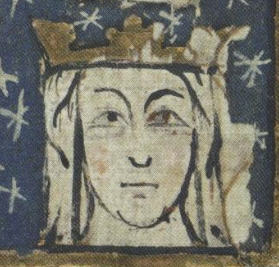Leonora of Castile or Eleanor of Castile may refer to:

Joanna I, known historically as Joanna the Mad, was Queen of Castile from 1504 and Queen of Aragon from 1516 to 1555. Modern Spain evolved from the union of these two kingdoms. Joanna was married by arrangement to Philip the Handsome, Archduke of Austria of the House of Habsburg, on 20 October 1496. Following the deaths of her brother, John, Prince of Asturias, in 1497, her elder sister Isabella in 1498, and her nephew Miguel in 1500, Joanna became the heir presumptive to the crowns of Castile and Aragon. When her mother, Queen Isabella I of Castile, died in 1504, Joanna became Queen of Castile. Her father, King Ferdinand II of Aragon, proclaimed himself Governor and Administrator of Castile. In 1506 Archduke Philip became King of Castile jure uxoris, initiating the rule of the Habsburgs in the Spanish kingdoms, and died that same year. Despite being the ruling Queen of Castile, Joanna had little effect on national policy during her reign as she was declared insane and imprisoned in the Royal Convent of Santa Clara in Tordesillas under the orders of her father, who ruled as regent until his death in 1516, when she inherited his kingdom as well. From 1516, when her son Charles I ruled as king, she was nominally co-monarch but remained imprisoned until her death.

Philip the Handsome, also called the Fair, was titular Duke of Burgundy from 1482 to 1506 and the first Habsburg King of Castile for a brief time in 1506.

Joan of Acre was an English princess, a daughter of King Edward I of England and Queen Eleanor of Castile. The name "Acre" derives from her birthplace in the Holy Land while her parents were on a crusade.

Joanna la Beltraneja was a claimant to the throne of Castile, and Queen of Portugal as the wife of King Afonso V, her uncle.

Eleanor of Castile was Queen of England as the first wife of Edward I, who she married as part of a political deal to affirm English sovereignty over Gascony.
Joan I or Joanna I may refer to:
Juana is a Spanish female first name. It is the feminine form of Juan, and thus corresponds to the English names Jane, Janet, Jean, Joan, and Joanna. Juanita is a common variant. The name Juana may refer to:

Juana Manuel was queen consort of Castile from 1369 until 1379. She was also the heiress of Escalona, Villena, Peñafiel and Lara, as well as Lady of Biscay.

Eleanor of Castile was an infanta of Castile and Queen consort of Navarre.

Mad Love is a 2001 period drama film written and directed by Vicente Aranda starring Pilar López de Ayala and Daniele Liotti. The plot follows the tragic fate of Queen Joanna of Castile, madly in love with an unfaithful husband, Philip the Handsome, Archduke of Austria.

Juana Enriquez de Córdoba, 5th Lady of Casarrubios del Monte was a Castilian noblewoman and Queen of Aragon from 1458 until her death as the wife of King John II. After their marriage in 1444, she was de facto Queen of Navarre. Juana married John three years after the death of his first wife, Queen Blanche I of Navarre.

Alfonso the Innocent was the figurehead of rebelling Castilian magnates against his half-brother Henry IV, who had recognized him as heir presumptive with the title of Prince of Asturias.

Joan of France, also known as Joan or Joanna of Valois, was the daughter of John II of France, and his first wife, Bonne of Luxembourg. She married Charles II of Navarre, and became Queen-consort of Navarre. She served as regent of Navarre during the absence of Charles II between 1369 and 1372.
Joan of Dammartin was queen of Castile and León by marriage to Ferdinand III of Castile. She also ruled as Countess of Ponthieu (1251–1279) and Aumale (1237–1279). Her daughter, the English queen Eleanor of Castile, was her successor in Ponthieu. Ferdinand II, Count of Aumale, her son and co-ruler in Aumale, predeceased her, thus she was succeeded by her grandson John I, Count of Aumale.

Ferdinand II was King of Aragon from 1479 to his death. As the husband of Queen Isabella I of Castile, he was King of Castile from 1474 to 1504 as Ferdinand V. He reigned over a dynastically unified Spain jointly with Isabella; together they are known as the Catholic Monarchs. Ferdinand is considered de facto the first king of Spain, being described as such during his own lifetime, although Castile and Aragon remained de jure two different kingdoms until the Nueva Planta decrees of 1707 to 1716.
Jeanne de Ponthieu, dame d'Épernon, Countess of Vendôme and of Castres was a French noblewoman, the youngest daughter of Jean II de Ponthieu, Count of Aumale. She was the wife of Jean VI de Vendôme, Count of Vendôme and of Castres. She acted as regent for her infant granddaughter Jeanne, suo jure Countess of Vendôme from 1371 until the child's premature death in 1372.
Joanna, Joan or Juana of Aragon may refer to:

La Loca(The Madwoman), also known as Juana la Loca(Crazy Joanna), is an opera by Gian Carlo Menotti, composed in 1979. It is a romantic drama about the life of Joanna of Castille (1479–1555). It was written as a vehicle for soprano Beverly Sills and received its premiere on June 3, 1979, at the San Diego Opera, followed by the New York City Opera. Critical response was largely negative, so Menotti completely reworked it. The revised version premiered in 1982 at the Festival of Two Worlds in Spoleto, Italy. The American premiere of the revised version took place at the Spoleto Festival USA in Charleston, South Carolina, on June 1, 1984.












